Peter MALONE
Saturday, 18 September 2021 19:23
Touch and Go
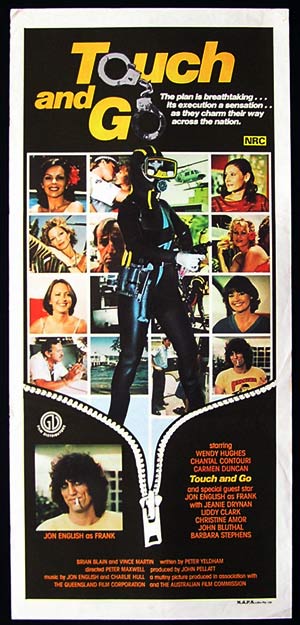
TOUCH AND GO
Australia, 1980, 85 minutes, Colour.
Wendy Hughes, Chantal Contouri, Carmen Duncan, Brian Blain, John Bluthal, Jon English, Barbara Stephens.
Directed by Peter Maxwell.
Touch And Go is the second Queensland Film Corporation-sponsored feature. (The first was Ross Dimsey's very poor thriller Final Cut). It is a potential commercial success, deservedly so. There have been umpteen crime capers in the '70s, but Peter Yeldham's screenplay is quite fresh, runs smoothly, gets us into the robberies with quite a few laughs. Australian cinema is strong in its actresses, so it was wisely feminist to have a group of lady burglars (for charity!). Wendy Hughes, Chantal Contouri, Carmen Duncan, all have good roles dominating the laugh providing men: John Bluthal caricaturing a Barrier Reef hotel owner, Brian Blain an obtuse husband, Jon English a bludging gardener. Nicely entertaining. Peter Maxwell has directed quite a number of Australian telemovies, Is There Anyone There?, Polly Me Love.
1. The popularity of the crime caper comedy? The number of these throughout the history of the cinema, particularly the 1970s? Familiarity from television series? The potential for stale material? How fresh and original the presentation here?
2. The use of New South Wales and Queensland cities and landscapes? The Barrier Reef? The beauty of the locations, their being worked into the plot? The skill of the editing for pacing? The musical score, Jon English's music and songs?
3. The decision to have lady burglars? The feminist points being made? The humour about feminism, the attack on male attitudes?
4. The initial robbery, the discovery of the motives, presuppositions about taking money from the wealthy e.g. shops and firms and hotels and giving to charity? The ladies and their charity meetings and all the formalities? Puns and humour about crime, men and women? The continued humorous tone throughout the film?
5. The presentation of the charity and the needy, Julia and her work with the children, her lending the van, the humour about crime, the children from the Far West in the flat at the end, the scene at the beach?
6. Eva and Wendy Hughes' style? Suave manner, her radio work, the parody with her being the Kookaburra voice? Her manner in interviewing Anatole, photographing the whole hotel, her presentation of the information to the women? Her strength in leading the group? Seeing him again at the Barrier Reef? The humour of pretending to be French? Her participation in the robberies? In the ending?
7. Carmen Duncan and her comic style as Millie? The glasses, the love for the policeman, her skill with locks? Her apprehensions and fears? Seeing her at work, her skill with the safes? Her drinking at the end?
8. Chantal Contouri as Fiona? Her home, her husband and the humour of married life and the attacks on her husband? Her clashes with Frank? At home, interviewing the potential helpers at the gymnasium, her crashing the car? Her quick thinking at the end?
9. The other girls and their work at the gymnasium, with the telegraph lines? Their being briefed, participation on the job? The ending and the hurry to the garbage tip?
10. George and Frank and the humour on the Australian male? George and his fussiness, his chauvinism, his work, attitudes towards Fiona, overseas travel? The encounter with the women at the end, his taxi? Frank and his bludging, his work, comments, criticisms of the upper class? The humour at the end and his discovery of the money, his being robbed?
11. Anatole and John Bluthal's skill at parody, the television ad, his boasting, showing Eva around the hotel, his being robbed? The personnel at the hotel? The lady who managed the bank and her attitude towards potential rape?
12. The lifestyle in the Barrier Reef hotels?
13. The humour of the women talking amongst themselves, their meals, bickering, parody of the woman's touch? The presentation of the initial robbery, the robbery of the sports store, the elaborate preparation for the final robbery, the skill in the execution, the alarm going off, the trawler and the attack on the men, the final escape? The feminine wiles with the police in order to get through? Waiting for the van, for the car, the garbage tip sequence, the taxi? The frantic pace of the ending?
14. How enjoyable a light comedy? Its use of Australian social themes with the light touch?
Published in Movie Reviews
Published in
Movie Reviews
Tagged under
Saturday, 18 September 2021 19:23
Time's Raging

TIME'S RAGING
Australia, 1985, 90 minutes, Colour.
Judy Morris, Michael Atkins.
Directed by Sophia Turkewicz.
Time's Raging is one of several telemovies commissioned by the Australian Broadcasting Corporation for 1985. It is a contemporary story about marriage and its breakdown, the clashes between men and women, careers.
It is based on Frank Moorhouse's Futility and Other Animals. Moorhouse and the director Sophia Turkiewicz (Letters from Poland, Silver City) wrote the screenplay. They are very well served by Michael Aitkens and Judy Morris in the central roles.
Moorhouse is a well-respected short story writer and novelist. His work in film includes narrating and writing The Disappearance of Azaria Chamberlain, a reflection on the myths underlying the Australian response to this case. He also collaborated with director Dusan Makajayev on The Coca Cola Kid.
The film is wittily written, has strong performances, raises questions of Australian values especially in terms of career, relationships, marriage and family.
1. An entertaining and interesting telemovie on contemporary people and contemporary issues?
2. The work of Frank Moorhouse, his delineation of character, sardonic observations, wit? Sophia Turkiewicz and her human films? An effective collaboration and adaptation?
3. The use of Sydney locations, the urban atmosphere: homes, airports, restaurants, workplaces?
4. The title and the irony of the passing of time, change, age, hopes and regrets? Time itself raging on and passing?
5. The screenplay devices: Lauren and her work, Cam ringing from New York, the situation of the broken marriage, the passing of the years, the flashbacks to their meeting, the building up to the present, the explanation of the crises, the repetitions of the crises, indications for the future?
6. The portrait of Lauren: seeing her with her family, her relationship with her parents, their stories about the older generation the photos? Traditional? Her meeting with Cam, being charmed by him, his stories? Their marriage and its basis? His career and journalism, her career and the law? Love, sharing? Lauren and her age, her desire to have a child? Cam's reaction to the possibility of children, his refusal? His buying her the dog, her reaction, her attachment to the dog, its being put down? Her career and coping? His telling her the truth about Margaret, the children? Her being hurt, the clash, turning him away? Her decision to live alone? The chance meeting with Margaret, the failure of the relationship with Cam, the discussion of the children? Her work with David, establishing the relationship, the affair? Her friendship with Jane, her advice? The passing of time, David and the affair, the possibility of a child? The build-up to Cam's return, her going to meet him, putting off David, his embarrassing turning up? The hearing and Cam's accountability to the Press Council, her working as his lawyer, support? Hopes, his changing? The irony of her becoming pregnant - and his backing out? The future of the middle-aged woman, her age, career, motherhood?
7. Cam as the Australian male, type? The encounter with Lauren and falling in love? His enjoyment of his mates' company, especially in the pubs, the stories? His talk, covering wars, his experience, success as a journalist? His love for Lauren? His talk, going to Melbourne, taking Margaret, telling the truth? His refusal to have a child, opting out of the marriage, beginning his affair? Moving to New York? His ringing, wanting to come home, his enjoyment of New York but feeling homesick, feeling Australia was too small for him, its limits? The reunion with Lauren? The friendship with Jane, with Jimmy - and the clash with Jimmy about the Press Council? The hearing, his being found guilty? His disgust with Jimmy? The possibility of a future with Lauren, the pregnancy, his preferring to be a wanderer? A sketch of the Australian male?
8. Jane and the comparisons with Lauren, her marriage, child, study? Her support and listening? Jimmy and his ambitions, work, the unions, the Press Council, the clash with Cam, the reconciliation?
9. Margaret and her television background, the children, leaving her husband for Cam, the affair,' its failure, the discussion with Lauren?
10. David and his work, a nice young man, the affair, the age difference, companionship and work, home, the friendship with Ros? His disappointment in being put off by Lauren, his visit, being drunk? Going to Bali with Ros?
11. A glimpse of Australian society, careers and pressures, relationships, self-esteem, commitment, breakdown of relationships?
12. A focus on journalists, their lifestyle, the pressures, ambitions? The Press Council - and the accountability of printing secret material?
13. The film's wit, accuracy, authenticity, insight?
Published in Movie Reviews
Published in
Movie Reviews
Tagged under
Saturday, 18 September 2021 19:23
Thoroughbred
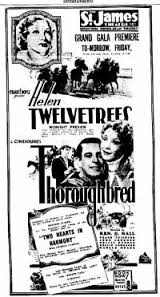
THOROUGHBRED
Australia, 1936, 89 minutes, Black and white.
Helen Twelvetrees, Frank Leighton, John Longden.
Directed by Ken G. Hall.
Thoroughbred was an ambitious Cinesound entertainment of the mid-'30s. Ken Hall had, by 1935, made a mark in producing popular entertainment well received in Australia. He used Hollywood models for his productions and promotion. For this film he imported silent star Helen Twelvetrees - who was feted during her stay in Sydney.
Hall was also on a sure thing with Australian interest in racing. There had been a number of silent films highlighting racing. There would be a number of films afterwards, especially Simon Wincer’s version of David Williamson's Phar Lap. There are many similarities between these two films (as well as highlighting the differences in production and techniques over 50 years). The film makes use of the authentic backgrounds of racehorse breeding, life in the cities, gangster connections with the racing industry, the Melbourne Cup. (It was pointed out that the end of the film was very similar to Frank Capra's 1933 Broadway Bill - which Hall said he had not seen.) The film was written by an American writer Edmond Seward.
The film is photographed by George Heath, has interesting locations as well as rear projection work. It has a regular Cinesound cast. The film creaks a little in retrospect - but was very successful in its time.
1. A popular film of the '30s? The work of Ken G. Hall and Cinesound? In retrospect?
2. Black and white photography, the bush, Sydney and Melbourne, authentic atmospheres? The spirit of racing in Australia? The rear projection work? The eclectic musical score ranging from the Donkey Serenade to thematic background?
3. The characters and types - American models, stereotypes? Local variations - and popular audience response?
4. The popularity of racing, horses, knowledge of horses and breeding, theories about blood and line, sport and gambling, crime? A piece of authentic Australiana?
5. The bush properties, the horse-training, lifestyle? Detail?
6. Ma and her horses (less good at driving cars!)? The clash with the Peels especially about bloodstock theories for horses and humans? Her adopting Joan? Tommy and his place on the property? Her managing horses, the races? The sparring with Peel? The reconciliation - except on the question of human bloodstock? The Australian tradition?
7. Joan as heroine? The American actress and the references to background in Canada? Lively, love of horses, friendly with Tommy, the choice of Stormalong? The training, the hopes, the races? Her liking for Bill? The rivalry between Tom and Bill? Home life. Sydney, the race, the injuries to Stormalong, the burning of the stables, the running of the race? Tommy's injuries? Final choices?
8. Tommy as rough, his not knowing so much about horses but learning, rivalry with Bill, sneering, manners, clothes, the top hat? The buying of Stormalong, the initial failures, growing success? His trying to prove himself? Clashes. the gangsters, kidnapped, the rescuing and the fight, his injuries? The happy ending with Joan?
9. The Peels and Australian aristocracy: the father and his theories, hopes for breeding the best racehorses? Bill and his English background, suave manner, Joan attracted? The Sydney sequences, the Melbourne Cup, the clash with Tommy, the various episodes? The finale - and his losing the heroine?
10. The range of racing hands, jockeys etc.? Authentic atmosphere, detail and comedy?
11. Jenna and the European background, the Italian criminal (referred by the Irish policeman as 'Dagol)? Plans, the tough henchmen, his manner - a caricature? The henchmen and the toughness, the imitation American gangsters, the injecting of the horse, the burning of the stables, the shooting of the horse?
12. The fights, the injections, the fire, the shooting?
13. The focus on the horse, buying of the horse, the early failures, the races, success, the super-horse effort in running the Melbourne Cup, falling, recovering, being shot, winning and dying? The foal?
14. All the ingredients of popular Australian entertainment, 1930s style?
Published in Movie Reviews
Published in
Movie Reviews
Tagged under
Saturday, 18 September 2021 19:23
Thirst
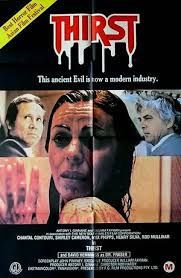
THIRST
Australia, 1979, 98 minutes, Colour.
Chantal Contouri, David Hemmings, Henry Silva, Max Phipps, Shirley Cameron.
Directed by Rod Hardy.
Melbourne producer Anthony Ginnane has made some popular B-budget genre films (with imported stars, here David Hemmings and Henry Silva), Patrick, Snapshot, and ventures into horror with Thirst. The taste for blood and vampires on our 1970s screens seems rather insatiable. But an elitist blood-drinking brotherhood (complete with industrial plant and laboratory research facilities for blood and its mass-marketing!!) in the Australian countryside! Constantly put-upon heroine Chantal Contouri, abducted from Toorak, finds this is definitely so. Full of plot-holes but fine glossy production look and enough blood (showers, vats and cartons of it) and tongue-in-cheek to get more than a footnote in the horror movie books.
1. Significance and tone of the title? Indication of themes - irony?
2. The perennial popularity of vampires and vampire stories and films? The mystical science fiction background, horrors, gore? The spoof aspects of their popularity in the late 170s? How successful the presentation of a vampire story, tongue-in-cheek presentation - in the Australian context?
3. The importance of colour, Panavision? The blends of decor - modern suburban settings, gothic mansions and the overtones of horror films, the modern factory and plant? The trappings associated with horror films? The melodramatic score and its moods and climaxes?
4. The importance of the editing - shocks, contrasts in moods? The importance of the special effects especially in the frightening of the heroine, the death of the doctor on the power lines? For the effect of the film. drawing attention to themselves?
5. An Australian production - quality, technique? The atmosphere of the international stars - for an international audience?
6. The opening of the film and the focus on Kate’s eye? Her terrified scream? The prologue of her torment and the build-up and return to it? The focus on terror? Kate as the heroine in perpetual terror through the film? Screams, tortured, put upon? Her strength, her fear? The presentation of the torture, the conditioning, the physical torment, the psychological pressure?
7. Kate as an attractive heroine? Seeing her at home, her Toorak background, her work, liaison with Derek, the prospect of the holiday, her help by Lori (and the ominous aspects of this later?)? Her competence, her return and her skill at work. Martha and her assistance at work. Kate as strong, practical and sensible? Her attempts to escape. the taking of the truck. the filling it with petrol? How credible a heroine for this kind of implausible story?
8. The importance of the theme of her ancestry? The motto., the emblem,. the thirst? The hints at the beginning especially with the spilt blood of the cat and her tasting the blood? Her reaction to the torture? Her being one of the elite? Her learning the background of the brotherhood and yet her desire to escape? The looking at the ceremony from outside and being invited in? Blunt trying to change her mind, Dr. Fraser and his persuasion? Her return home and the shower of blood, the collapsing room, the ever-present goblet. the room collapsing? Her inability to drink milk? The culmination with the ritual and her identifying with it., drinking the blood of the man? Her hallucinations as regards Derek and Lori? Dr. Fraser and his persuasion, the use of Derek to lure her into consent? The end and her acceptance of the condition? The ugliness of her killing of Martha? Given the basic implausibility of the plot and the tongue-in-cheek style., how consistent was the plot development?
9. The importance of thirst and blood, the use of the colour red, the milk gartered with blood, the attention to*detail of the factory and the production of blood and the assembly line? The experimentation and medical research on blood? The blood on the goblet, the shower, the walls seeping blood, Mrs Barker killed in the vat of blood? The significance of blood in general for life, psychological tones of blood? Blood used in horror and violent films? How interestingly did this film use the symbol and the realism of blood?
10. The ironies of the farm - the use of factory and plant yet the outside primitive huts? The contrast with the gothic house and rooms? The use of the factory even with the tour for the international visitors? The experiments, the surgery and research? The donor's room with the playing of classical music? The zombies and their dress, walking around the swimming pool? The black humorous aspects of the presentation? Why?
11. The borrowings from science fiction? The super race, the brotherhood, the reasons behind the farm, the experiments, the rituals? The international group there and their presence on the tours, at the services?
12. The character sketches of the staff - David Hemmings and Dr. Fraser and his moderation, persuasion, his participation in the ceremony, his killing of Mrs. Barker, the luring of Derek and his being of service to Kate? Mrs. Barker and her harsh methods, her superiority. the clash with Dr. Fraser and her death, her head and hand appearing after her death? The other doctors and their taking sides, experiments, the doctor on the helicopter and his fall to death on the power lines? Mr. Hodge and his place on the staff, his lust, plans for marriage, deceiving Kate as Derek? His presence at the ceremony? The use of Shaun as a spy, his reporting back on Kate's life, his participation in the work of the staff?
13. The contrast with the ordinary staff at the farm - nurses, technicians, soldiers and security, the tourist guide? The irony of presenting them as ordinary in comparison with the professionals?
14. The visualising of the victims and their zombie-like behaviour and recreations, swimming? At the machines? The young man and his story of his girlfriend? His being on the altar? The old man sawing the wood, the taking of his car, his being victimised and the blood taken from him? Martha as ordinary secretary and victim?
15. The special effects and the capacity of the institute to create illusions especially for Kate and her treatment, the continued surveillance and television? The room and its turning, shaking apart? The blend of the ordinary and the day-to-day with the exotic?
16. The importance overall of the experience of the heroine? As ordinary, heritage, her desires. her desire to be normal? Her repugnance at the information? The pressure to change? The will to survive and her being transformed, taken over? The audience sharing this?
17. The popularity of themes of evil, victims of evil? Old traditions in 20th. century guise?
Published in Movie Reviews
Published in
Movie Reviews
Tagged under
Saturday, 18 September 2021 19:23
Third Person Plural

THIRD PERSON PLURAL
Australia, 1979, 90 minutes, Colour.
Bryan Brown, Linden Wilkinson, George Sheutsou, Margaret Cameron.
Drected by James Ricketson.
Third Person Plural is a feature film by James Ricketson. Ricketson studied in the '70s at the Australian Film and Television School as well as the University of New South Wales. He made documentaries for television and also worked as a trainee nurse at a psychiatric hospital. One of his earlier shorts showed this in the breakdown of a film director's marriage, Reflections. He made an effective short feature called Drifting, about a young artist selling paintings, and a university student. The film explores relationships and is further complicated by a character from the Sydney drug scene.
This feature is a very verbal film - the characters engage in (seemingly at times interminable) conversations. The film relies on the audience paying full attention and wanting to be interested in the characters. This is a bit presumptuous as the characters are very ordinary in their way - not all that interesting. However, as a way of exploring the inner life of the characters and the effect on their relationships with one another, Third Person Plural is an entertaining enough avant-garde exploration. The frequently present Bryan Brown is the star. Fringe Australian drama.
1. An interesting film, entertaining? For what audience was it made? Filmmakers, the wide audience? Many critics condemned it as boring. How true is this?
2. The film was made with help from a creative and experimental fund. The value of this kind of fund and the quality of the product? Audience interest in experimental film, improvised acting? Documentary style, emphasis on techniques and patterns of realism? Effects of editing?
3. An Australian production, Australian atmosphere and themes? Locations - exteriors and the water, the boat? Interiors, the homes? Lighting? Atmosphere?
4. The significance of the title and its indication of themes? The four central people as 'they'? Their interrelationship as I-You?, We?
5. The film opening with Naomi and her comments, zest for life, statements about life's meaning, her own experience, life's purpose? Her indicating themes? The close-up of the ants? Her role as catalyst - presumably in Danny's film, as a character in herself, her relationship to the two girls and talking with them, with the whole group? The personal touch, her communication with the audience?
6. Themes of zest, meaning for life? The four variations on these themes with the main characters? Their comment on the attitudes and behaviour of one another? A means of insight by these comparisons? By looking at the two pairs and the comparisons of the pairs?
7. The plot and the presentation of the trip - the flashbacks to the preparations for it, the group meting one another, introductions? The trip itself and the small events, swims, excursions, the champagne-drinking? The emphasis on the aftermath of the trip and what the trip had led to? The repercussions? The linear development of the plot and the way it was interspersed with flashbacks, imagination, flash forwards?
8. The pairing of Mark and Danny? Mark's shyness, a man of imagination yet inhibited? A theoretician, a scientist, the great detail of information about ants, the laboratory sequences? His authenticity in his work and Danny's comment on this? The inhibited side of his character and his moving out, trying to be forward? Commenting on Danny's work and criticising her film? How well presented was Danny as a character, an attractive woman, her interest in Mark and relating to him, discussions, questions and answers? Her reaction to his proposal, criticism of her film? A future together?
9. The importance of absolutes and relativism? Theoretical and the way these were illustrated in their discussions? In their relationship? The lengthy and repetitive discussions about meaning, anxiety? The locations for these discussions - in fact, imagination? Their compatibility, complementarity?
10. Beth and Terry as a couple? The sensuous aspects of their relationship in comparison with the intellectual discussions of Danny and Mark? Thews of freedom, lack of inhibition, Beth's nude swimming, Terry and his free moral attitudes? Their discussions about relationships, love, sexuality? The consequences and responsibilities? The effects on Beth and her giving in to her love for Terry yet her love for Toby? Her decisions, the lack of help from Terry? His working on his boat, casual attitudes. being agreeable, his not wanting to see her all the time? The decision to part? His visiting her later and planning to go off on a trip? Genial, how shallow? The theme of absolutes and relativism and their relationship?
11. The character portrait of Toby and his being seen with his wife - love, in the park, staying home working, the contrast with Terry and Beth. Joachim and his place in Beth's life? The separation? The ability to cope separated? Beth's dream of the farm and her plans and study for it?
12. Separations and reunion? The parallels of the two couples? The enigma of Beth torn between the two men and loving them both? Naomi's presence and catalyst for these relationships?
13. The effect an the audience of the improvisation, the establishing of roles, the quality of the dialogue, the delineation of the characters, the presentation of issues? Helped by the editing? A film of questions and/or answers?
Published in Movie Reviews
Published in
Movie Reviews
Tagged under
Saturday, 18 September 2021 19:23
That Lady from Peking
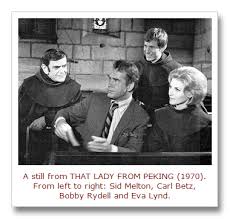
THAT LADY FROM PEKING
Australia/US, 1970, 86 minutes.
Carl Betz, Nancy Kwan.
Directed by Eddie Davis.
That Lady From Peking is the third collaboration between Goldsworthy Productions and Commonwealth United. Three films were made on Australian locations with American stars and Australian supporting cast. This was in 1968-69 before the rebirth of the Australian industry. It Takes All Kinds and Colour Me Dead were quite effective routine thrillers. However, this film is rather poor. The films were written and directed by Eddie Davis. Jack Thompson and Tom Oliver amongst others can be seen in the supporting cast. Sid Melton tries his best in a gangster-comic role. However, the plot is complicated and rather unreal and many of the Hong Kong streets look remarkably like Sydney suburbs. There is use of Luna Park and Palm Beach and Bar Lighthouse. Of interest only as made in Australia.
1. The appeal of the action thriller? The standard of this film?
2. The conventions of the genre - Hong Kong backgrounds, gangsters, Russian and Chinese spies? Journalists? Tough attitudes, violence, sex? Comedy? The transition from Hong Kong to Australia? Chases? How well were these conventions used?
3. Location photography - Hong Kong, Australia? Special effects for fights and chases etc.? The score? Bobby Rydell's songs?
4. The plausibility and implausibility of the plot? The escape from Communist China, life in Hong Kong and spies and contacts,, violence? The transitions to Australia and the quick access of Chinese spies. Russian spies and ordinary citizens in getting into Australia and rushing round Australia chasing one another? Credible for this kind of plot - or far-fetched?
5. Max as hero - the escapee from China.. the possibility of writing his book? The contacts with the various women ~ Marissa? The being chased by the Russian spies and leaping out windows etc., off bridges,, disappearing? His relationship with Buddy? With Miss Singleton? The talks with the lady from Peking and the pursuit in Australia? Dangers, the final confrontation and the fight in the church? A credible hero or not?
6. The title and the reference to the Chinese spy, her presence in Hong Kong, the chase to Australia, the final pursuit and the fight in the church? Marissa and her courier service in Hong Kong - and her death? The daughter of the Russian writer and her presence on the ship, the time bomb, the chase in the church - and romance!
7. Buddy as the American singer, younger brother, his songs? His not knowing what was going on, the Luna Park chase, the boat off the lighthouse, the church?
8. The mixture of villains - Russians and their continually turning up, the toughs in Sydney, the Chinese? The attempts at characterisation - the action sequences?
9. The issues involved. the special effects to make them credible and the finale with the heroes disguised as monks!
10. The purpose of this kind of film - entertainment, television fodder? An Australian-American? co-production?
Published in Movie Reviews
Published in
Movie Reviews
Tagged under
Saturday, 18 September 2021 19:23
Temperament Unsuited
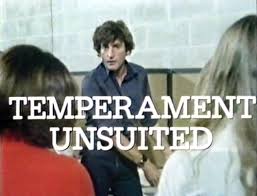
TEMPERAMENT UNSUITED
Australia, 1978, Colour, 58 minutes.
Steve J. Spears, Robin Nevin, Ken Goodlet.
Directed by Ken Cameron.
Temperament Unsuited is the third short film by writer-director Ken Cameron. At first a teacher for the N.S.W. Education Department, he records that experience in Sailing To Brooklyn, and the present film. His second film, called Out Of It (1976) dealt with the unemployed and crime. Steven J. Spears, the author of the successful "The Elocution of Benjamin Franklin", is very good as the teacher-trainee with the touch of the rebel whom we see in his teaching round. Robin Nevin, the star of several Australian films including Libido and The Irishman, is the bored middle-aged teacher. Ken Goodlet is very good as the 'typical teacher'. The film, shot on location in a N.S.W. school and with some of the students, captures very well the atmosphere, the language, the styles of the day-by-day living in the school. It asks many questions. It doesn't offer clear-cut answers but asks many helpful and penetrating questions and leaves it to the audience to draw conclusions. A very good example of the kind of interesting narrative that can be made with a small budget which not only tells a story but also is very good on social observation and critique.
1. The impact of this short film? Slice of life, brevity, Australian, themes of education, human beings?
2. The style of the film and its authentic atmosphere, schools, teacher training, situations, characters, language.. attention to detail of school life, contemporary education issues?
3. Audiences identifying with the situation? The area of interest as regards education - teachers. school administration, curriculum, classes, training? The questions raised?
4. Mark as the focus of the film? The credits and the mime? His place as a teacher-trainee, his response in the initial session, sense of humour, touch of the rebel? The type who starts things? His skills in the rehearsal, his ear for the way people reacted and spoke? His arrival at the school and his manner and dress? His reaction to the teaching of 'Antony and Cleopatra' and the reading of it, the record? 'The Lord of the Flies'? The move outdoors and dramatising 'Lord of the Flies'? His reaction to Anne, liking her, criticising her methods? His identification with the pupils? Manner of speaking with them? The girls and their admiration? His bike and the tyres being let down. his reaction? The sparring with Anne? The outing with her, drinking, spending the night with her? Their discussion? Their models of teaching and education? His relationship with Christine? His room, echoing himself and reflecting his interests and style, left-wing approach. Labour Party support? Christine's reaction to leaving? The review of his work with Ross? The attempt to work with the children again, 'The One Day Of The Year' and the re-enactment of the scene? The examiner and his report? The focus on the title as summing up Mark? How well did the film delineate his character, represent him as a type? Did the screenplay support his views completely? Critical of his views? A portrait of a person and his reactions to the Australian education system?
5. The comparison with Anne? How similar would she have been to Mark at the beginning of her career? The way she had, coped with the teaching, her tiredness, boredom? Her attitudes to the pupils and her treatment of them, authoritarian, moody? Her reaction to the rest of the staff? Her interest in Mark, interest in his experiments, sympathy about the bike? Her preoccupation with herself? Her outing with him, drinking, the sexual encounter? The background of her marriage, her need to talk? Did she change at all through the encounter with Mark? How well delineated as a character, a type? Did the film endorse her views, criticise them?
6. Christine and her enthusiasm, teaching, training, the liaison with Mark and the bond between the two, love, friendship? The class? The part? Her changing? Seeing her at how, the swimming pool. her parents, brother and the camera? (How well observed was the family?) Mark within this situation? Was Christine right in deciding to leave teaching?
7. The picture of the trainer? Ross and his style, attitude towards the trainees, way of speaking? His comments on being out of the day by-day teaching situation? His handling of mark, advice to him?
8. Seedy Yates (the local joke?) and his attitude towards
education - the book hire and his treatment of the students, his attitude towards English, his correcting the students and looking out the window, his manner of rebuking them, the caning of the boys (and Mark's reaction to this and demonstration, Yates' reaction?), his watching of Mark's classes, the encounter outside the classroom? His behaviour in the staff room, calling Mark to the book hire room? His comments as regards the administration of the school, his expectation of the students? The film's critique of his point of view, how necessary are his attitudes in the education system?
9. The picture of the staff room, the buzz of talk, the people involved, the secretary, the duplicating etc.? The P.A. system and the styles of the announcements?
10. The picture of Australian schools - buildings, curriculum. classes and their techniques, the boredom of the children, recreation? The variety of responses of the students? Those that are interested, answering questions asked, listening to 'Antony and Cleopatra', participating in 'Lord of the Flies', re-enacting the drunk sequences from 'The One Day of the Year'? Could the students learn with this kind of method? The passing of exams? The programming of time throughout the day to keep students occupied?
11. To what purpose is education? Mark and his theories of enjoying education? The critique of the critical parent approach to the children? The purpose of teacher- training?
12. The inspector and his presuppositions, his arrival, the various details noted about Mark's failure to comply with expectations? His watching 'The One Day of the Year'? His filling in the form?
13. How well did the film capture the atmosphere of our schools and teaching? A critique not by intellectual argument but by portraying people and situations? Were the right questions asked? The quality of the solutions? The critique of the system and its self-perpetuation? How necessary is opting out of a system? As a solution?
Published in Movie Reviews
Published in
Movie Reviews
Tagged under
Saturday, 18 September 2021 19:23
Taxi
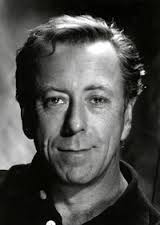
TAXI
Australia, 1979, 90 minutes, Colour.
Steve Bisley.
Directed by Russell Haag.
Taxi is an Australian telemovie, brief and ironic in its tone. The hero, played by Steven Bisley of The Last of the Knucklemen, is a pleasant mixture of the ocker with a flat accent and a heart of gold, working-class, afraid of the police and a past record, yet a man of concern for a lady in distress and for following through principle. One could wonder how accurate a picture of the Melbourne taxi driver this is - but he corresponds to a popular story hero with all the right sentiments. The plot gains in interest because it is directly connected with real Victorian land deals and corruption and investigation. The story it offers, while using the conventions of thrillers, is not entirely incredible.
1. An entertaining and interesting telemovie? Adaptation of plot and characters for home viewing?
2. The Australian tone of the film, Melbourne locations, production values, style?
3. The quality of the screenplay: the importance of Terry's narrative, the taxi driver's version of the private eye conventions? The world of taxis in the city, involvement with characters, dangers? Terry as hero narrating his own experiences, getting deeper and deeper into dangerous situations, encountering the ugly aspects of city life, his heroics? His ironic comments on his behaviour? How plausible, credible?
4. The background of real Victorian land deals and scandals in the '70s? The repercussions for government, state government, local authorities, corruption?
5. The taxi driver's view of the city and the way this was visualised? The range of passengers - the talking old lady, the alcoholic looking for the massage parlour etc.? The importance of cars, transport, communication? The taxi driver's eye view of people and events?
6. Terry as hero? An interesting type, his background, manner? His talking to the audience and confiding in them? His revealing himself and his attitudes? Was he a good taxi driver? His interest in his passengers? His involvement with Clare, her handbag, pursuing her, worried about her? His going to Armitage and the puzzle growing? The discussions about Eddie Fabian and gangsters? His fear of the police? The growing involvement and his motivation, his preoccupation with Clare becoming obsessive? Going into difficult situations, physical assault and threats, his working out what was happening? His decision to emulate the heroics of films? A hero from the middle classes and the working classes? His motivation - concern for people, principles?
7. The picture of his friend and their discussions about the events, a way of commenting on the pros and cons of Terry's involvement?
8. The world of Armitage and big business, the law, information about land deals, political espionage, threats and corruption? His marriage, involvement with Clare, his ownership of her apartment? The fact that he was set up by Fabian and Clare? The repercussions for government officials? Terry's lack of sympathy for him?
9. Clare as the damsel in distress, her reaction when Terry found her, her pleas? His realising that she was part of the set-up? Her betrayal of Armitage?
10. Eddie Fabian as gangster - type, reputation, seeing him at how, shooting practice, his hold over Clare, the set-up for Terry and Armitage? His henchmen and their violence? The involvement of this kind of person in land deals? The final shoot-outs?
11. The henchmen and their brutal behaviour, the violence and danger in the taxi driver's world?
12. The attention to detail that the film had - of Melbourne itself, streets, buildings, flats, Terry's visit to the various offices to discover the ownership of the flats, country estates etc.?
13. Popular story heroics, audience identification with Terry and his behaviour? Admiration for an ocker hero?
Published in Movie Reviews
Published in
Movie Reviews
Tagged under
Saturday, 18 September 2021 19:23
Tail of a Tiger
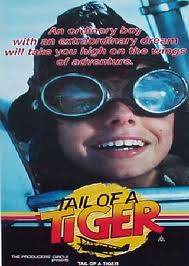
TAIL OF A TIGER
Australia, 1984, 80 minutes, Colour.
Grant Navin, Gordon Poole, Caz Lederman.
Directed by Rolf de Heer.
Tail of a Tiger is a very pleasing family film, especially for a young boys' audience. It focuses on model planes - and the fantasy of a young boy, significantly called Orville, who dreams of a real plane and flying it. His dream comes true.
The film has excellent inner-city settings of Woolloomooloo with views of Sydney Harbour. It also has strong themes of Australian family relationships, bullying and peer pressure, sympathy for 'derelicts' and there is a strong plea for understanding of aborigines. It is all blended together to satisfy audiences as well as to help them learn.
1. An entertaining story for the family, for children, for boys? Australian audiences? The wider audience?
2. The use of Sydney, Woolloomooloo and its streets, the docks and warehouses? Location photography? Interiors? Stunt work? The fantasy sequences and their insertion? The spirited score?
3. The title and its reference to Tiger Moths, to Orville’s hopes, his quest and success? Delight?
4. The sketch of boys in the city, the model planes and their skills, the gangs and the push, the bullies, peer pressure. the toughs? Orville. his height. glasses? His intellectual interests? His being knocked and knocked down? His building his model plane, hiding it ~ and its being broken? His dreams and his knowledge? As an engaging young boy? At home, his mother, the meals., his deceiving her, hurting her, being locked up? His sister and saving the boys from the bullies? The clashes with Rabbit? Friendship with Beryl? Discovering Harry, their clash, the genuine friendship, working together, the challenge of the plane? Harry as a hero? Comparisons with Orville's grandfather? The details of the building. the parts, their secret? The bonds between the two? Beryl and her helping with the sewing? His being locked in by his mother. the letter with Rabbit? Beryl and Harry visiting and his freedom? Harry's fantasy friends? The launching of the plane and the exhilaration of the flight and success?
5. Harry as the old man, the derelict, living in the warehouse, cranky, having a plane, his suspicions of Orville. friendship. being made to be a hero. the support of his memory companions., the details of building the plane, his opinions on fighting, Beryl and the visit to Orville’s mother? His fright at the end? Being forced to be a hero? The final success?
6. The family sequences, the mother and her coping with the children, wanting Orville to be honest? Beryl's visit, her anxiety and the happy ending?
7. Orville's sister and her being able to beat the toughs? Rabbit and his mischievousness, repeating his mother's words, taking the message and giving it to the bully?
8. Beryl and her friendship, the boys annoying her, the dung burnt at her doorstep, the demand for an apology, helping Orville, dressing up and visiting with Harry? Doing the sewing for the plane? The themes of aborigines in the city, understanding? Compassion? Friendship?
9. The boys and their bullying style, the leader, the gang, the fistfight - and Harry saying it was a mugs' game? The attack of the gang and the flour fight?
10. The sketch of school, Orville dreaming?
11. Boys at play, dreams and their fulfilment? A Boys' Own adventure '80s style?
Published in Movie Reviews
Published in
Movie Reviews
Tagged under
Saturday, 18 September 2021 19:23
Tuesdays With Morrie
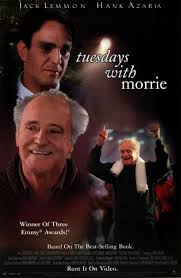
TUESDAYS WITH MORRIE
US, 1999, 85 minutes, Colour.
Jack Lemmon, Hank Azaria, Caroline Aaron.
Directed by Mick Jackson.
Tuesdays With Morrie is based on the writings of Mitch Albon, a university student of Morrie's whom he saw as a mentor and who liked to be called Coach. Albon became a sports commentator and journalist and did not fulfil his promise to keep contact with his mentor. However, when he discovers that Morrie is dying of Lou Gehrig's Disease and has appeared on television to talk about his understanding of life given the imminent experience of death, he goes to see him. The friendship is renewed, Mitch starts interviewing Morrie and recording their conversations. Mitch undergoes a strong change of heart as well as of lifestyle, being able to commit to his girlfriend and realising that a hectic and frantic pace is not everything that he wanted to achieve in life.
Jack Lemmon is Morrie and gives an extraordinarily persuasive performance as the creative sociology lecturer, with a poor New York migrant background (which is visualised in flashbacks) and a sad relationship with his hard father, befriends the student whom he had admired in the past. Since Jack Lemmon died in 2001, this film is something of a last will and testament on screen and makes the audience think back to his extraordinary forty-five year career on screen from Mr Roberts and Some Like It Hot to older more serious films like The China Syndrome and Missing. His partnership with Walter Matthau in many films including The Odd Couple also come to mind.
The film is quite moving, the taped interviews between Mitch and Morrie contain a great deal of wisdom, common sense and a realistic approach to the experience of death. Direction is by Mick Jackson, an English director, A Very British Coup and then, in the United States such as The Bodyguard.
1. The impact of this telemovie? Based on a true story? The testament of Mitch Albon and the last will and testament of Jack Lemmon?
2. Audiences identifying with the ordinary/extraordinary Morrie? His academic life, the flashbacks to his past, his love for dancing, his family, his becoming ill, the television interview, his coping with death?
3. Mitch Albon as a writer, Detroit sports, the media, his pressures for writing columns, doing interviews? The book and the film becoming something of his autobiography? His memories of Morrie, the influence, the promise not kept? His feeling bad while seeing Morrie on TV? The potential for change, for commitment?
4. Mitch and Janine, her singing, her willing to commit to Mitch, his putting things off, wanting to wait? Her deciding to break with him? His anguish, the phone calls, the proposal by letter, the ring? His speaking to Morrie about her and Morrie wanting to meet her? Her agreement, coming to the airport? His watching Janine with Morrie, especially her singing the Gershwin song to him?
5. Morrie and the flashbacks, the portrait of his father, migration, poverty, work, his mother and her death, his stepmother and resisting her, finally realising what a good woman she was, his indebtedness to her? Poverty, work in a factory? Learning from his father not to do things because he had to but rather with a spirit of freedom? His father being hurt in a mugging, his death? Seeing him in his dreams and in imagination as he was dying? A reconciliation with his father?
6. Morrie and his dancing, his joy in life, his collapse? The analysis of Lou Gehrig's Disease and its wasting effect 'dissolving from the inside'? The devotion of his wife, his children? The nurse and her care and friendship with him? Going on the television, accepting his illness and death, learning from it? The exhilaration of having his funeral service with his friends before he died? The increasing pain, his acceptance of the dependence on others for everything? His enjoyment of Mitch's visits, the past falling away and his admiration for Mitch and hoping that he would continue the friendship? Morrie and his aphorisms, comments about the meaning of life, detachment? Nickname Coach? Mitch listening, the effect of the tapes, Morrie's ups and downs? The build-up to his final collapse, his death?
7. Mitch and his having to give his time to Morrie, learning the ordinary caring skills of carrying him, toilet, the scene with the massage and the masseur's explanation of how it cleared Morrie's lungs? Mitch's never crying, his weeping at the funeral? Janine's presence at the funeral?
8. Mitch's skill at his work, his sports commentaries, articles? The editor and the pressure and his resisting him? The young athlete and his scholarship, the press conference? Enthusiasm? His arrest for drug-taking, the media mass pursuing the footballer, Mitch finding himself tripped, on the floor, pursuing the athlete? His quiet discussion with him at the football stadium and promising to do justice by him?
9. The importance of popular films like this about illness and death? Audience identification with characters and themes? With a star like Jack Lemmon in the last years of his own life?
Published in Movie Reviews
Published in
Movie Reviews
Tagged under